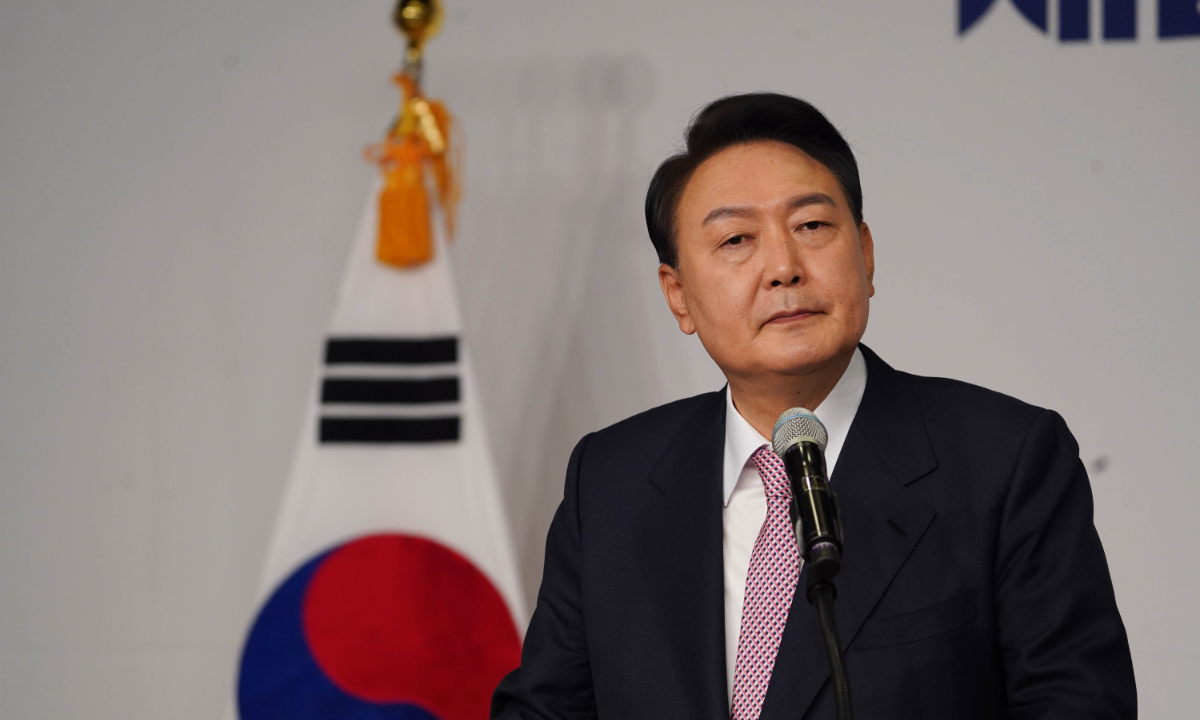
Yoon Suk-yeol Photo: Xinhua
South Korea’s series of diplomatic actions in the past two days after the country’s president Yoon Suk-yeol made inappropriate remarks on the Taiwan question have left the Chinese people more confused than indignant. “The Taiwan question is purely an internal affair at the core of China’s core interests. Its resolution is a matter for the Chinese, who do not need to be told what should or should not be done.” How did these powerful words from a Chinese Foreign Ministry spokesperson, repeated many times, become “unspeakable” and “a serious diplomatic discourtesy that calls into question China’s national integrity” to the South Korean side?
Instead of explaining or apologizing to Beijing for Seoul’s interference in the Taiwan question, the South Korean Foreign Ministry summoned the Chinese ambassador as a “strong protest” and raised the issue to the level of “national integrity.” Who is being rude and unreasonable? This is not the way how the thief cries “thief” if Seoul wants to play this trick. Some Chinese netizens wonder if Seoul’s reaction was so strong because the South Korean side had translated the Chinese side’s words wrongly and misunderstood them, but this possibility is quite low. The problem highly likely lies in South Korean diplomacy.
Chinese State Councilor and Foreign Minister Qin Gang stressed at the Lanting Forum on Friday that “Those who play with fire on Taiwan will eventually get themselves burned.” This principled statement did not name anyone, but was immediately picked by the South Korean Foreign Ministry, which even expressed its hope that China would be "careful with its words and deeds." The fact that the South Korean side is so sensitive and agitated only shows that it has a guilty conscience and does, in fact, see itself as one of “those who play with fire on Taiwan.” There is a simple and clear criterion for judging the object of a warning without naming it: It is said to those who will respond to it.
Going back to the starting point of this diplomatic spat, the South Korean leader’s comments on the Taiwan question in an interview with Western media were not only inappropriate but also seriously wrong to the ears of all Chinese people. This statement by the Yoon administration on the Taiwan question is the worst one by the South Korean side since the establishment of diplomatic relations between China and South Korea in 1992. Once again, the Taiwan question is purely an internal affair of China, not a so-called global issue. It is fundamentally different from the issue between North and South Korea and not comparable to it at all.
Anyone with some basic historical knowledge knows that North and South Korea became separate independent countries based on a series of international agreements during and after World War II, and both were admitted to the United Nations (UN). The island of Taiwan, on the other hand, was designated to be returned to China based on international agreements made during World War II, and the Chinese government at that time resumed its sovereignty over Taiwan. Although the two sides of the Taiwan Straits have not yet been reunified, their territories and sovereignty have not been divided, and Taiwan is still a part of China. More than 180 countries, including South Korea, recognize and support the one-China principle. Relevant documents of the UN clearly state that the UN considers Taiwan a province of China with no separate status. It is suggested that the diplomatic authorities of South Korea learn more history and accurately understand the one-China principle.
The South Korean leader made those remarks regarding Taiwan just before his upcoming trip to the US, which naturally led people to think that he was showing loyalty to Washington. Trying to please the US by offending and provoking China has resulted in some countries losing their integrity.
When the leaked US classified documents revealed that US intelligence agencies had illegally monitored the dialogue of South Korea’s top officials, why didn’t South Korea “strongly protest” this serious violation of rights but instead act like a meek kitten? When South Korea demanded that its consortia give compensation for forced labor by Japan during World War II, where was the “national integrity” that it always emphasizes? Does South Korea want to regain its lost “integrity” and diplomatic self-esteem in Washington by demonstrating strength against China? It seems that South Korean diplomacy needs to strengthen its learning of history and address its tendency of grovelling when facing the US.
China has shown real and even extra diplomatic respect to South Korea, and we hope South Korea can show some self-respect.
We initially thought that South Korea, which has suffered the painful memory of national division, could better understand China’s feelings and support its position on the Taiwan question. But we would have never thought that the South Korean side could have said such ignorant and malicious things about the Taiwan question, while acting like a punching bag and looking aggrieved. Had it not been for this incident, we would not have known how far South Korea’s misconceptions about the Taiwan question had gone. South Korean diplomacy needs to reflect deeply on this.




